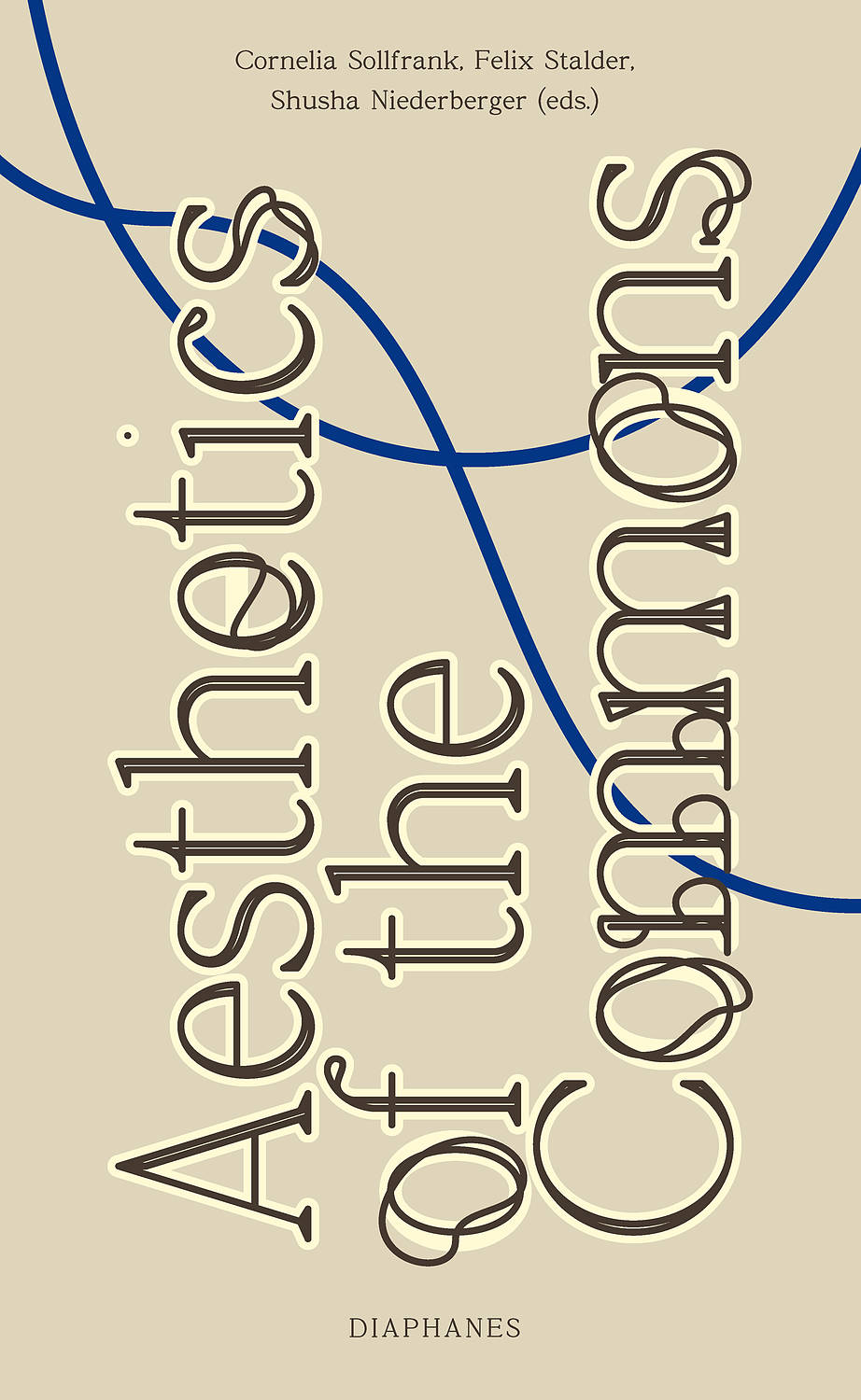Cornelia Sollfrank, Felix Stalder, Shusha Niederberger (eds.): Aesthetics of the Commons (2021)
Filed under book | Tags: · aesthetics, affect, archive, art, care, commons, digital culture, infrastructure, knowledge, library, piracy, shadow library, theory

“What do a feminist server, an art space located in a public park in North London, a ‘pirate’ library of high cultural value yet dubious legal status, and an art school that emphasizes collectivity have in common? They all demonstrate that art can play an important role in imagining and producing a real quite different from what is currently hegemonic; that art has the possibility to not only envision or proclaim ideas in theory, but also to realize them materially.
Aesthetics of the Commons examines a series of artistic and cultural projects—drawn from what can loosely be called the (post)digital—that take up this challenge in different ways. What unites them, however, is that they all have a ‘double character.’ They are art in the sense that they place themselves in relation to (Western) cultural and art systems, developing discursive and aesthetic positions, but, at the same time, they are ‘operational’ in that they create recursive environments and freely available resources whose uses exceed these systems. The first aspect raises questions about the kind of aesthetics that are being embodied, the second creates a relation to the larger concept of the ‘commons.’ In Aesthetics of the Commons, the commons are understood not as a fixed set of principles that need to be adhered to in order to fit a definition, but instead as a ‘thinking tool’—in other words, the book’s interest lies in what can be made visible by applying the framework of the commons as a heuristic device.”
Contributors: Olga Goriunova, Jeremy Gilbert, Judith Siegmund, Daphne Dragona, Magdalena Tyzlik-Carver, Gary Hall, Ines Kleesattel, Sophie Toupin, Rahel Puffert and Christoph Brunner.
Publisher diaphanes, Zürich, January 2021
Creative Commons BY-NC-ND 4.0 License
ISBN 9783035803914
275 pages
Reviews: Gerald Raunig (transversal, 2021, DE), Jaime Groetsema (ARLIS/NA, 2021), Agnieszka Wodzińska (Network Cultures blog, 2021), Alessandro Ludovico (Neural, 2021).
Project website
Book launch
Publisher
WorldCat
See also Open Scores: How to Program the Commons (2020).
Comment (0)Martina Griesser-Stermscheg, Nora Sternfeld, Luisa Ziaja (eds.): Sich mit Sammlungen anlegen. Gemeinsame Dinge und alternative Archive (2020) [German]
Filed under book | Tags: · archive, archiving, collecting, commons, curating, library, museum

“Wie lässt sich die Idee der Commons im Kontext von Museen, Archiven und Sammlungen denken? In welchem Spannungsverhältnis stehen alternative Sammlungsstrategien und die Reproduktion eines etablierten Kanons? Welche Rolle spielen künstlerische Praxen für die Demokratisierung und Zugänglichmachung von Sammlungen?
Gegen den Trend einer zunehmenden Ökonomisierung und Kanonisierung des Sammelns gibt es immer lautere Stimmen, die Leerstellen in Sammlungen kritisieren und Diskussionen über neue diverse Sammlungsstrategien befeuern. Versteht man die Schaffung von Commons auch als eine soziale Praxis für die Formulierung alternativer Formen der Wissensproduktion und des Wissensaustauschs, so eröffnen sich für öffentliche Museen, Sammlungen und Archive herausfordernde Fragestellungen hinsichtlich Zugänglichkeit, Eigentum und Öffentlichkeit. Ausgehend von dem kürzlich erschienenen Band Sich mit Sammlungen anlegen. Gemeinsame Dinge und alternative Archive entwickeln die Beitragenden neue Perspektiven auf die Verknüpfung etablierter institutioneller Infrastrukturen und alternative Methoden des Sammelns.
Mit Antonia Alampi, Stefan Aue, Filipa César, Knut Ebeling, Martina Griesser-Stermscheg, Belinda Kazeem-Kamiński, Vera Lauf, Cornelia Sollfrank, Nora Sternfeld, Luisa Ziaja, Franciska Zólyom u. a.”
Publisher De Gruyter, Berlin, 2020
Angewandte series
ISBN 9783110700442, 3110700441
300 pages
Book launch (with video discussion)
Project
Editors
Publisher
WorldCat
PDF (27 MB)
Comment (0)Lawrence Liang, Monica James, Danish Sheikh, Amy Trautwein, Another: Invisible Libraries (2016)
Filed under fiction | Tags: · book, library

“In Chemin-des-dames, a memorial library may be found encased in a series of catacombs, while in Memorious, the living have themselves become an oral record of literature. The rules of Linearis mandate fidelity to a book till its completion, while Dermestis Lardarius houses books in a state of half-eaten incompleteness. Journey further into this world, and you will find libraries taxonomized by smell, composed of marginalia, etched in ice, and forged in nightmares.
Invisible Libraries captures the sensuous, enigmatic and aesthetic world of books and libraries. Taking a cue from Italo Calvino’s Invisible Cities, the authors explore bibliophilia, especially in the way it manifests itself via our love affair with libraries.”
Publisher Yoda Press, New Delhi, 2016
Creative Commons BY-NC-SA License
ISBN 9789382579274, 9382579273
vii+102 pages
Reviews: Parvathy Raveendran (Scroll.in, 2017), Ahalya and Ritika (Trilogy, 2017).
PDF (10 MB)
Comment (0)
